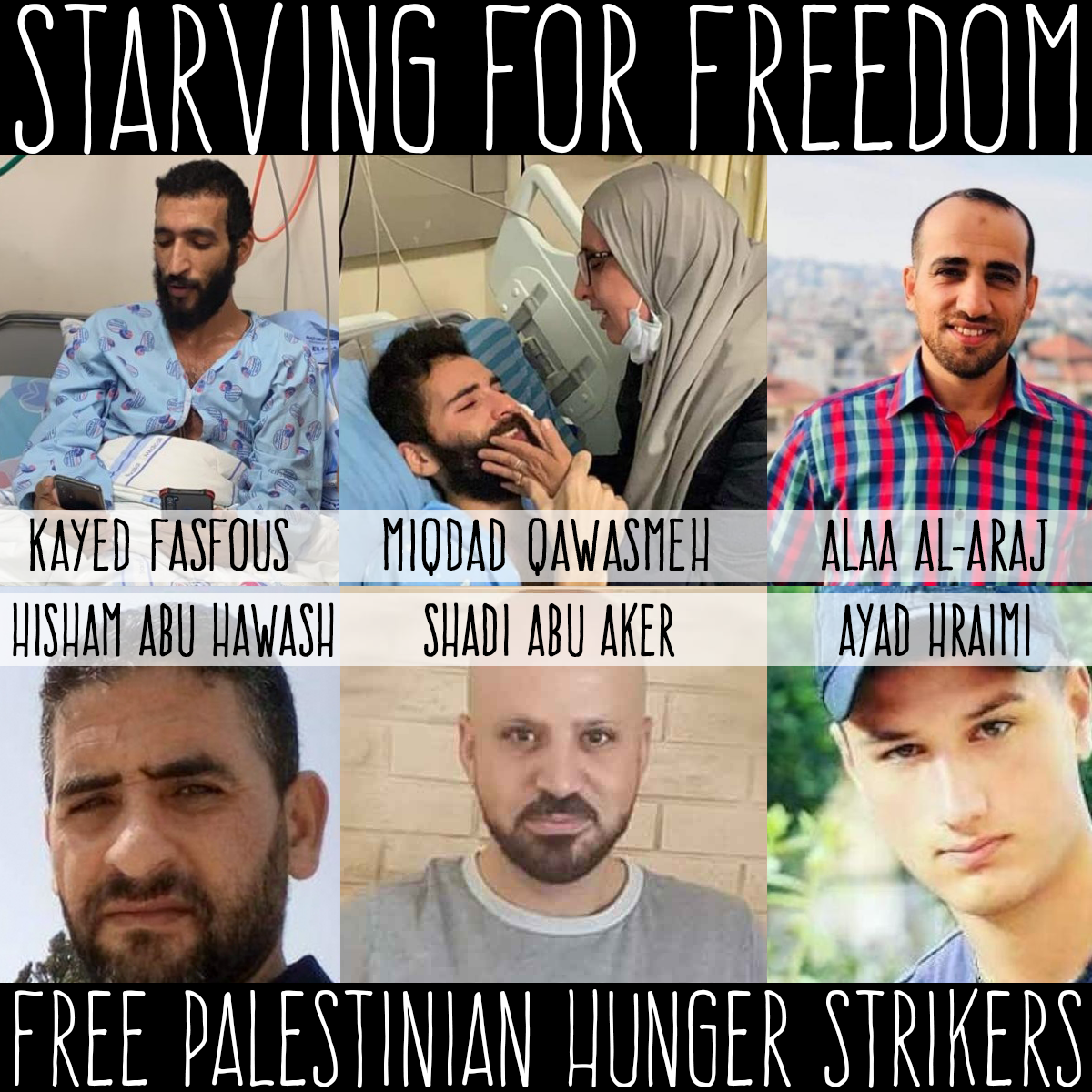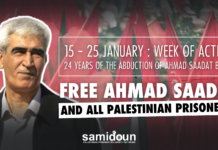
Six Palestinian prisoners are continuing their hunger strikes to demand freedom from arbitrary imprisonment without charge. Kayed Fasfous is entering his 100th day of hunger strike on 22 October 2021. The 32-year-old Palestinian prisoner is jailed without charge or trial, held in Barzilai hospital after serious deterioration of his health. Fellow hunger striker Miqdad Qawasmeh, on hunger strike for 93 days, a Palestinian university student held under administrative detention, confronted Israeli medics attempting to force glucose and supplements on him after he was transferred to the intensive care unit at Kaplan hospital.
Samidoun Palestinian Prisoner Solidarity Network urges all people of conscience and organizers for Palestine and social justice to take action to defend their lives and act for their freedom at this critical moment.
Fasfous and Qawasmeh are among six Palestinian administrative detainees jailed without charge or trial carrying out long-term hunger strikes to demand their freedom and the end of the policy of administrative detention. With Fasfous and Qawasmeh on hunger strike are Alaa al-Araj, Hisham Abu Hawash, Shadi Abu Aker and Ayad Hraimi. All six are demanding their freedom from administrative detention, indefinitely renewable imprisonment without charge or trial.
From his hospital bed, Fasfous declared that “I will either go home or be martyred,” on his 98th day of hunger strike. Both Fasfous and Qawasmeh had their administrative detention “frozen” by the Israeli Supreme Court, and both refused to end their hunger strike, noting that this is a mechanism to induce Palestinian detainees to stop striking, only to reimpose their detention as soon as their health improves slightly. They both declared that they will continue their strikes until freedom.
Fasfous, a fitness enthusiast and bodybuilder before his detention, has lost at least 30 kilos (66 pounds), and Qawasmeh has also suffered severe weight loss. Qawasmeh is unable to speak or stand and suffers from pain throughout his body. Despite the “suspension” of his detention, he is constantly overseen by three jailers who eat in front of him as a form of pressure to end his strike. He was denied a visit from lawyer Jawad Boulos on 20 October, despite the suspension of his detention; similarly, Kayed Fasfous’ wife has been expelled from the hospital on at least three occasions on allegations of not having sufficient permission to visit him.
Doctors and lawyers warned that Qawasmeh was in danger of sudden death at any moment and that his symptoms indicated potential neurological damage, which could have long-term consequences for his health. Qawasmeh’s mother declared that occupation doctors tore his clothes, handcuffed his hands and feet and attempted to force feed him intravenously with supplements and glucose over his objections.
Khader Adnan, former long-term hunger striker who won his freedom from administrative detention on multiple occasions, denounced the attack on Qawasmeh as a heinous crime, urging action by international human rights and humanitarian organizations, including the International Committee of the Red Cross, in response to forced feding.
Allam Kaabi, director of the Handala Center for Prisoners and Former Prisoners, denounced force feeding, emphasizing that it has been rejected by the World Health Organization. “Every claim that the goal of force-feeding is to preserve the life of the prisoner on hunger strike is false. Rather, the real goal of it is to break the prisoner’s steps of struggle and intensify his suffering,” Kaabi said.
Meanwhile, Israeli courts have refused to even “freeze” the administrative detention of Alaa al-Araj, despite his strike for 76 days, and Hisham Abu Hawash, on strike for 67 days. Along with Shadi Abu Aker, on strike for 59 days, they are held in the Ramle prison clinic and repeatedly transferred back and forth to civilian hospitals and the prison. All are suffering from vision problems, vomiting, physical weakness and severe bodily pain, and the repeated transfers are another form of physical and psychological pressure attempting to compel them to end their strikes.
Ayad Hraimi has now also been on hunger strike for 30 days — a full month — held in isolation in Ofer prison.
What Is Administrative Detention?
Administrative detention was first used in Palestine by the British colonial mandate and then adopted by the Zionist regime; it is now used routinely to target Palestinians, especially community leaders, activists, and influential people in their towns, camps and villages.
There are currently approximately 520 Palestinians jailed without charge or trial under administrative detention, out of 4,650 Palestinian political prisoners. These orders are issued by the military and approved by military courts on the basis of “secret evidence”, denied to both Palestinian detainees and their attorneys. Issued for up to six months at a time, they are indefinitely renewable, and Palestinians — including minor children — can spend years jailed without charge or trial under administrative detention.
Who Are the Hunger Strikers?
- Kayed Fasfous, 32, from Dura – al-Khalil, started his strike 100 days ago. He is 36 years old, detained without charge or trial since July 2020. He is married and the father of the daughter; his three brothers, Akram, Mahmoud and Hafez are also detained by the Israeli occupation (Akram and Mahmoud earlier joined the hunger strike.) Before he was arrested, he was working in Dura municipality and had recently returned to Hebron University to complete his computer science degree, which he was earlier unable to complete due to repeated arrests.
- Miqdad Qawasmeh: from al-Khalil, started 93 days ago. Miqdad Qawasmeh is a Palestinian university student, 24 years old. He has been jailed without charge or trial since January 2021 and is held in Ofer prison. He has previously spent around 4 years in occupation prisons over various arrests since 2015.
- Alaa al-Araj: from Tulkarem, launched his strike 75 days ago. He has been jailed since 30 June without charge or trial under administrative detention and is held in Megiddo prison. He is 34 years old and a civil engineer; he has been detained multiple times since 2013, including being held without charge or trial under administrative detention.
- Hisham Ismail Abu Hawash, 39, from Dura, al-Khalil, has been on hunger strike for 66 days. He has been jailed without charge or trial since October 2020 under Israeli administrative detention. Over multiple arrests, he has spent eight years in Israeli prisons. He is married and the father of four children; his youngest child suffers from kidney failure.
- Shadi Abu Aker, 37, from Aida refugee camp in Bethlehem, has been on hunger strike for 59 days to reject his administrative detention. He has been jailed without charge or trial since October 2020. Married and the father of two children, he is a former prisoner who spent 10 years in Israeli prison before his release in 2012. He has since been held under administrative detention three times.
- Ayad Hraimi, 28, from Bethlehem, has been on hunger strike for 30 days against his administrative detention without charge or trial. He previously conducted a 45-day hunger strike against administrative detention in 2016; he has been repeatedly arrested by the Israeli occupation, mostly without charge or trial under administrative detention. He was arrested in April 2021 less than two months after he was released from previous administrative detention.
Samidoun Palestinian Prisoner Solidarity Network urges all supporters of Palestine to take action to support these Palestinian hunger strikers and all Palestinian prisoners struggling for freedom, for their own lives and for the Palestinian people. They are confronting the system of Israeli oppression on the front lines, with their bodies and their lives, to bring the system of administrative detention to an end. Take these actions below to stand with the hunger strikers and the struggle for liberation of Palestine, from the river to the sea!
Download these signs for use in your campaigns:
- Poster/Sign: End Administrative Detention
- Poster/Sign: Free Hunger Strikers and All Prisoners
- Poster/Sign – End Administrative Detention (with Palestinian Flag)
TAKE ACTION:
Sign the petition!
Independent grassroots international activists have launched a petition in support of the hunger strikers and to end administrative detention. Show your support by signing on – in addition to taking action in person! Sign here: change.org/
Join the Social Media Campaign!
There is a growing social media campaign to #SaveKayed #SaveMiqdad and #FreeThemAll. Use these hashtags and the social media action sheet to post on Twitter and Instagram. Post in all languages! Many people have been conducting online hunger strikes in solidarity with the prisoners. Take action and join the social media outrage and break the isolation imposed upon them by the Israeli occupation!
Protest at the Israeli Embassy or Consulate in Your Country!
Join the many protests taking place around the world — confront, isolate and besiege the Israeli embassy or consulate in your city or country of residence. Make it clear that the people are with Palestine! Send us your events at samidoun@samidoun.net.
Take to the streets: Organize a protest in solidarity with Palestine!
Take to the streets and join the actions on our full list of events, which is constantly being updated as new actions are announced! Organize your own if there is none in your area, and send us your events at samidoun@samidoun.net.
Boycott Israel!
The international, Arab and Palestinian campaign to boycott Israel can play an important role at this critical time. Local boycott groups can protest and label Israeli produce and groceries, while many complicit corporations – including HP, G4S, Puma, Teva and others, profit from their role in support Zionist colonialism throughout occupied Palestine. By participating in the boycott of Israel, you can directly help to throw a wrench in the economy of settler colonialism.
Demand Your Government Sanction Israel!
The racist, settler colonial state of Israel and its war crimes against the Palestinian people are enabled and backed extensively by the over $3.8 billion each year given to Israel by the United States — targeted directly to support the Israeli occupation military killing children, women, men and elders throughout occupied Palestine. From Canada to Australia to the European Union, Western governments and imperialist powers provide ongoing diplomatic, political and economic support to Israel as well as selling billions of dollars of weaponry to the settler-colonial state. Meanwhile, they also purchase billions of dollars in weaponry from the Israeli state. Governments in league with imperialist powers, such as in the Philippines, Brazil, India and elsewhere, also buy weapons and “security” services — all “battle-tested” on the Palestinian population. Call your representatives, MPs, political officials and demand your government sanction Israel now, cut off all aid, expel its ambassadors, and stop buying and selling weapons!
Discover more from Samidoun: Palestinian Prisoner Solidarity Network
Subscribe to get the latest posts sent to your email.




